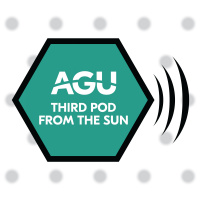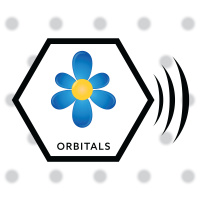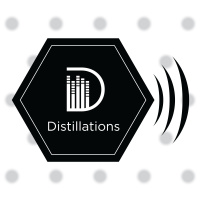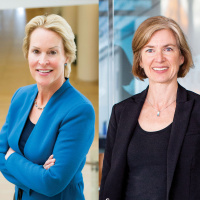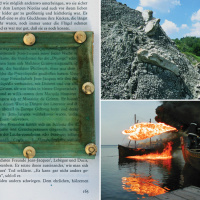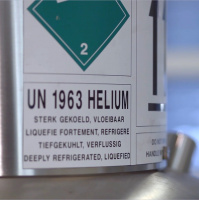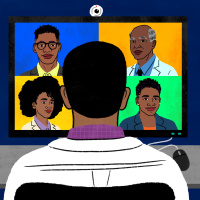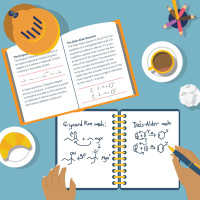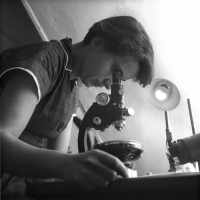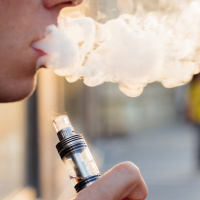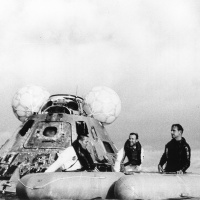Sinopsis
Stereo Chemistry is chemistry news told by the people making it. C&EN is the news magazine of the American Chemical Society.
Episodios
-
BONUS: Astronaut Leland Melvin’s journey from chemistry to the cosmos
21/09/2021 Duración: 37minThis month, Stereo Chemistry is sharing an episode of Third Pod from the Sun, a podcast from the American Geophysical Union, featuring an interview with retired astronaut and former professional athlete Leland Melvin. In the episode, Melvin describes how an early—and explosive—interest in chemistry grew into a scientific career at NASA and two missions to the International Space Station. Find more stories from Third Pod from the Sun at thirdpodfromthesun.com, Apple podcasts, and wherever you get podcasts. Image credit: Courtesy of Third Pod from the Sun/C&EN
-
BONUS: How body farms can help solve cases
24/08/2021 Duración: 23minThis month, Stereo Chemistry is sharing an episode of Orbitals that features an interview with forensic chemist Shari Forbes, an expert in human decomposition who studies the odors of decomposition at a body farm in chilly Quebec. Research at body farms—research facilities dedicated to studying what happens to human bodies after death—supplies law enforcement with valuable information about the process of decomposition in various scenarios. A transcript of this episode is available at bit.ly/3jdvLFN. Find more stories from Orbitals on the American Chemical Society’s website, acs.org, or wherever you listen to podcasts. Image credit: Courtesy of Orbitals/C&EN
-
BONUS: Rare earths’ magic comes at a cost (Part 2)
27/07/2021 Duración: 33min(Part 2/2) This month, Stereo Chemistry is sharing a pair of episodes from Distillations, a podcast from the Science History Institute. We rely on rare-earth elements to make many essential technologies like smartphones, medical imaging devices, and wind turbines. But how much do you know about where these extraordinary materials come from? In this two-part series, Distillations hosts Alexis Pedrick and Elisabeth Berry Drago explore the source of rare earths’ “magic,” the costs of acquiring these elements and what scientists are doing to try to find a way to produce them sustainably. A transcript of this episode is available at https://bit.ly/373odhN. Find more stories from Distillations at Distillations.org. Image credit: Courtesy of Distillations/C&EN
-
BONUS: Rare earths’ magic comes at a cost (Part 1)
27/07/2021 Duración: 27min(Part 1/2) This month, Stereo Chemistry is sharing a pair of episodes from Distillations, a podcast from the Science History Institute. We rely on rare-earth elements to make many essential technologies like smartphones, medical imaging devices, and wind turbines. But how much do you know about where these extraordinary materials come from? In this two-part series, Distillations hosts Alexis Pedrick and Elisabeth Berry Drago explore the source of rare earths’ “magic,” the costs of acquiring these elements and what scientists are doing to try to find a way to produce them sustainably. A transcript of this episode is available at https://bit.ly/373odhN. Find more stories from Distillations at Distillations.org. Image credit: Courtesy of Distillations/C&EN
-
BONUS: Celebrating LGBTQ+ excellence with My Fave Queer Chemist
29/06/2021 Duración: 48minThis month, we’re sharing an episode of the podcast My Fave Queer Chemist. Hosted by graduate students Bec Roldan and Geraldo Duran-Camacho, the show celebrates the excellence of LGBTQ+ chemists everywhere. Stereo Chemistry is excited to share this recent episode featuring inorganic photochemist Irving Rettig. In the episode, Rettig discusses his background in art conservation, his experiences finding support and community in grad school, and his work promoting transgender-inclusive name change policies within academic publishing. Note: This episode includes the use of slang terms for some members of the LGBTQ+ community. A transcript of this episode is available at bit.ly/3624azW. Follow My Fave Queer Chemist on Twitter at @MFQCPod. Find new episodes at anchor.fm/mfqc. Read C&EN’s article "LGBTQ+ Chemists You Should Know About" at cenm.ag/historiclqbtq. Image credit: My Fave Queer Chemist/Will Ludwig/Yang Ku/C&EN
-
Ep. 41: Searching for Mars’s missing water
25/05/2021 Duración: 22minMore than 50 years of missions to Mars paint a clear picture of a cold, dry, desert planet. And at the same time, photographs, minerals, and other data tell scientists that Mars once had as much water as Earth, or even more. Why are the two planets so different today? In this episode of Stereo Chemistry, we talk to scientists about the latest research on Mars’s water and where they think the water went. Listen to the end of the episode for an announcement about the future of Stereo Chemistry. Sign up for C&EN’s newsletter at bit.ly/chemnewsletter. A transcript for this episode is available at bit.ly/3hPfHcP. Image credit: Kevin Gill/Flickr based on data from NASA/JPL/University of Arizona/USGS
-
Ep. 40: Reducing toxic metals in food
20/04/2021 Duración: 31minToxic elements like lead, arsenic, mercury, and cadmium in food are not a new problem. But when they show up in pureed vegetables and other foods intended for babies, alarm bells go off. That’s what happened in recent months following a bombshell congressional report that found neurotoxic metals in baby food from multiple manufacturers. In this episode of Stereo Chemistry, host Kerri Jansen and C&EN reporter Britt Erickson explore the fallout from that report and renewed efforts by baby food manufacturers, regulators, advocacy groups, and agricultural scientists to rein in the problem. Subscribe to Stereo Chemistry now on Apple Podcasts, Spotify, or wherever you get your podcasts. Instructions for adding Chemistry Update to your smart speaker are available at cenm.ag/chemistryupdate. An edited transcript of this episode is available at bit.ly/32JQhox. Image credit: Ollinka/Shutterstock
-
Ep. 39: How research on aging could keep us healthier longer
23/03/2021 Duración: 28minLiving longer has been a human obsession for centuries, but while medical science has helped extend average life span, not all those extra years can be healthy. It turns out that aging is a major risk factor for disease. Follow along as host Kerri Jansen and reporter Laura Howes ask if instead of extending life span, we could extend health span and how modern science could make that a reality. An edited transcript of this episode is available at bit.ly/2NKNZkV. Help us shape the future of Stereo Chemistry by taking the survey at bit.ly/StereoChemSurvey. Image credit: Yang H. Ku/C&EN
-
Ep. 38: Nobel laureates Frances Arnold and Jennifer Doudna on prizes, pandemics, and Jimmy Page
16/02/2021 Duración: 30minWhere do you take your career after you’ve won all of science’s biggest prizes? In this episode of Stereo Chemistry, C&EN executive editor Lisa Jarvis sits down with Nobel laureates Frances Arnold and Jennifer Doudna to hear about whether their career goals changed after they got that early-morning phone call in October and how the pandemic has shifted the way they approach their work. A script of this episode is available at bit.ly/3u7jCW7. Sign up for C&EN's newsletter at cenm.ag/chemnewsletter. Catch up on last year's package of trailblazing women chemists, edited by Jennifer Doudna, at cenm.ag/2020trailblazers. Image credit: Caltech (Arnold)/Laura Morton Photography (Doudna)
-
Ep. 37: Historians pursue centuries-old chemical secrets—Green reading glass, Bologna stones, and Greek fire
19/01/2021 Duración: 24minResearchers want to invent the technologies of the future, but there are plenty of chemical questions lurking in the past. In this episode of Stereo Chemistry, C&EN assistant editor Gina Vitale joins host Kerri Jansen to explore the centuries-old secrets and nagging mysteries that keep science historians up at night—and how these researchers go about solving them. A script and additional resources are available at bit.ly/3qGGHg5. Sign up for C&EN’s Grad Student Survival Guide at cenm.ag/gradsurvivalguide. Image credit: Marjolijn Bol/Lawrence Principe/John Haldon
-
Ep. 36: How will Biden’s election impact chemistry?
15/12/2020 Duración: 16minAs we prepare for a new US president, many chemists are wondering how the administration change may affect them and their work. Will President-Elect Joe Biden change immigration policies that have reduced the number of foreign students studying at US universities? How might scientific integrity standards in the federal government change under the Biden-Harris team? And will this administration grant the chemical industry’s wish to stop the trade war with China and other US trading partners? In this episode of Stereo Chemistry, C&EN policy reporter Cheryl Hogue joins host Kerri Jansen to help orient listeners to how a Biden administration is likely to impact the world of chemistry. A script for this episode is available at bit.ly/37oPYT9. Find all C&EN’s COVID-19 coverage at cenm.ag/coronavirus. Make a donation to support C&EN’s nonprofit science journalism at cenm.ag/donate. Image credit: Luca Perra/Shutterstock
-
Ep. 35: Grad students, lab injuries, and workers’ compensation—it’s complicated
17/11/2020 Duración: 24minMany grad students may be surprised to learn their university’s policies for reimbursing medical fees for lab injuries do not cover grad students, or cover grad students only under certain circumstances. And it can be hard to get clarity on what is and is not covered. That’s left some grad students in an uncomfortable limbo of seeking answers after they’ve already racked up thousands of dollars in bills for an injury in the lab. In the latest episode of Stereo Chemistry, we uncover the source of this confusion and ask what—if anything—grad students can do about it. A script for this episode is available at https://bit.ly/3kMwE5O. Read C&EN’s cover story, "Who pays when a graduate student gets hurt?" at bit.ly/2INB4M5. Sign up for the Grad Student Survival Guide at cenm.ag/gradsurvivalguide. Image credit: danielfela/Shutterstock
-
Ep. 34: Chemists confront the helium shortage
21/10/2020 Duración: 26minHelium shortage 3.0 is winding down. But 2021 is likely to bring more changes to the global market for this critical, non-renewable gas. And even if there isn’t another crunch, scientists who use helium are tired of unstable supply of a material they need to keep their instruments running. In this episode of Stereo Chemistry, we’ll look at what’s behind the wobbly helium market and what scientists and instrument makers are doing to lift the heavy burden of helium use. A script for this episode is available at bit.ly/34nmunf. Find all of C&EN’s COVID-19 coverage at cenm.ag/coronavirus. Make a donation to support C&EN’s nonprofit science journalism at cenm.ag/donate. Image courtesy of Bruker BioSpin
-
Ep. 33: On being #BlackInChem
23/09/2020 Duración: 24minIn August 2020, Black chemists and allies took to Twitter to celebrate the inaugural #BlackInChem week. The social media campaign highlighted the diversity and accomplishments of Black chemists at all stages of their career and also created space for candid discussions about the discrimination these scientists face in chemistry. In the latest episode of Stereo Chemistry, host Kerri Jansen and reporter Ariana Remmel hear from Black chemists from a variety of disciplines across academia and industry about the current state of diversity, equity, and inclusion in the chemical sciences and what non-Black allies can do to support Black chemists. Update 11/24/20: In response to listener feedback, C&EN has added an editor's note to this episode. View the note at bit.ly/361aFUR Sign up for C&EN’s newsletter at bit.ly/chemnewsletter 9 Black chemists you should know about: bit.ly/2FioR0l More resources and a script for this episode are available at bit.ly/361aFUR Image credit: Daniel Fishel
-
Ep. 32: Should organic chemistry’s name reactions go the way of mouth pipetting?
19/08/2020 Duración: 26minScientists have been naming ideas, theorems, discoveries, and so on after other scientists for a very long time (Newton’s laws of motion, anyone?). Chemists are no different. They’ve been naming reactions after each other since about the early to mid 1800s. Nowadays, organic chemists in particular use them as a kind of shorthand. However, because the majority of name reactions honor white men, some organic chemists wonder if using these names is exclusionary. In the latest episode of Stereo Chemistry, host Kerri Jansen and reporter Leigh Krietsch Boerner hear from a plethora of organic chemists on how reactions get named, who they’re named after, and whether the practice should stop. A script of this episode is available at bit.ly/3kU3enk. Share your thoughts with us on Twitter! Tweet at us @cenmag, @absoluteKerri, and @LeighJKBoerner, using the hashtag #namereactions. View the Twitter thread that inspired this episode at bit.ly/34a2dS6. Read about the 2020 class of C&EN’s Talented 12 at cenm.ag/T12. Re
-
Ep. 31: A world without Rosalind Franklin
22/07/2020 Duración: 23minRosalind Franklin and her lab assistant famously imaged the structure of DNA using X-ray crystallography, an achievement that directly facilitated James Watson and Francis Crick’s discovery of the double helix. For what would be Rosalind’s 100th birthday, the Stereo Chemistry team consults scientists and historians to envision the many ways the world might be different without the now-famous Photograph 51. Listen to the Distillations episode “Science on TV” at bit.ly/30yjZuU. A script of this episode is available at bit.ly/3hqR9Uf. Image credit: Henry Grant Collection/Museum of London
-
Bonus episode: Talking TSCA—is the chemical law living up to expectations?
17/06/2020 Duración: 17minThis month marks 4 years since the Toxic Substances Control Act, or TSCA, was revised to boost confidence in chemical safety in the US by strengthening regulations. The updated law gave the Environmental Protection Agency sweeping new authority to ensure that the tens of thousands of chemicals in everyday products do not pose unreasonable risks to human health and the environment. In this bonus episode of Stereo Chemistry, host Kerri Jansen and C&EN senior reporter Britt Erickson examine how the EPA is using that authority to evaluate new chemicals before they hit the market and to assess the risks of chemicals that have been in use for decades. Is the EPA protecting public health by sufficiently evaluating the risks of chemicals, or is it giving industry a free pass to market chemicals with little toxicity data? A script of this episode is available at bit.ly/2UTlD8F. Image credit: Barry Barnes/Shutterstock
-
Ep. 30: The chemical culprit in 2019's mysterious vaping illnesses—what we still don't know
27/05/2020 Duración: 29minMonths before the novel coronavirus took hold of the globe in late 2019, clusters of patients began appearing in emergency rooms throughout the US with a mysterious lung disease. Investigators quickly linked the illnesses not to a pathogen, but to patients’ use of vaping products. By examining the chemicals in these products, they eventually found a chief suspect: vitamin E acetate. The compound was being used as a cutting agent in some counterfeit or illicit cannabis-based vaping products. Still, many questions remain about how vitamin E acetate could have caused those injuries and whether it was acting alone. In this episode of Stereo Chemistry, host Kerri Jansen and C&EN senior reporter Britt Erickson sift through the complicated chemistry of vaping and explore some new evidence in the investigation. They’ll also discuss how the tragic events of last summer could prove to be a wake-up call for chemical regulators as they evaluate vaping products. A script of this episode is available at bit.ly/2ZJ1JjW.
-
Ep. 29: This virus is here now, it's going to stay with us
01/05/2020 Duración: 35minAs COVID-19 continues to spread, so does the effort to treat and vaccinate against the novel coronavirus that causes the disease. Around the world, scientists are working nonstop on the different therapies that they hope will quell the loss of life during this pandemic while, at the same time, setting us up to prevent future outbreaks. What’s not clear is which, if any, of these treatments will work. Much about SARS-CoV-2 remains unknown. In this episode of Stereo Chemistry, we dig into the efforts to beat the novel coronavirus and why, in some cases, it’s like throwing spaghetti up against the wall to see what sticks. Image credit: NIAID-RML
-
Bonus episode: That just isn’t how you land on the moon without crashing
10/04/2020 Duración: 14minFifty years ago this week, an explosion on the Apollo 13 moon mission stranded three astronauts hundreds of thousands of miles from home. You probably know that Fred Haise, Jim Lovell, and Jack Swigert made it home safely (water landing shown, with two of the astronauts in white). You may not know the chemist behind the rocket engine that saved them, which began its life as an apparatus for measuring chemical reaction rates. This bonus episode of Stereo Chemistry tells the story of the engine’s design with help from two of the people who created it. Listen now to a tale that starts with an explosion and ends with SpaceX’s pioneering reusable rockets, with one small step for a man along the way. CORRECTIONS: This episode was updated on April 15, 2020, to reflect that Fred Haise, not Ken Mattingly, flew aboard Apollo 13. On April 22, 2020, this podcast description was also corrected to reflect Haise's role and clarify that the photo shows only two of the astronauts. To learn more about the chemistry of rocke

